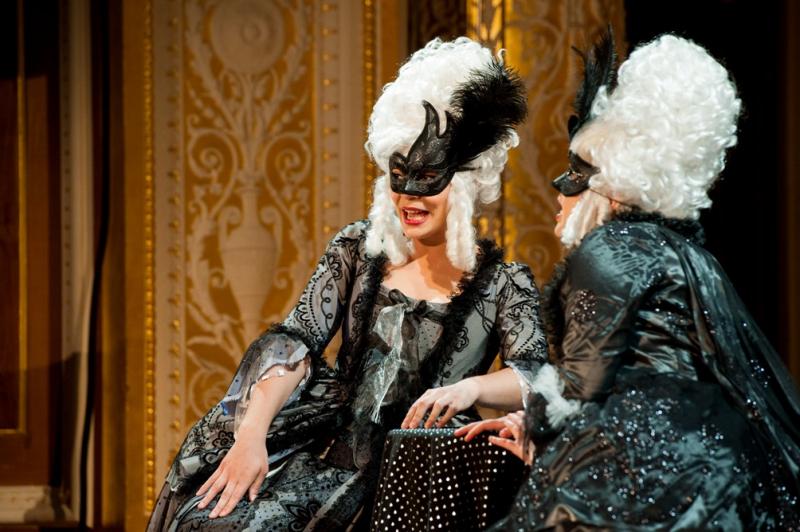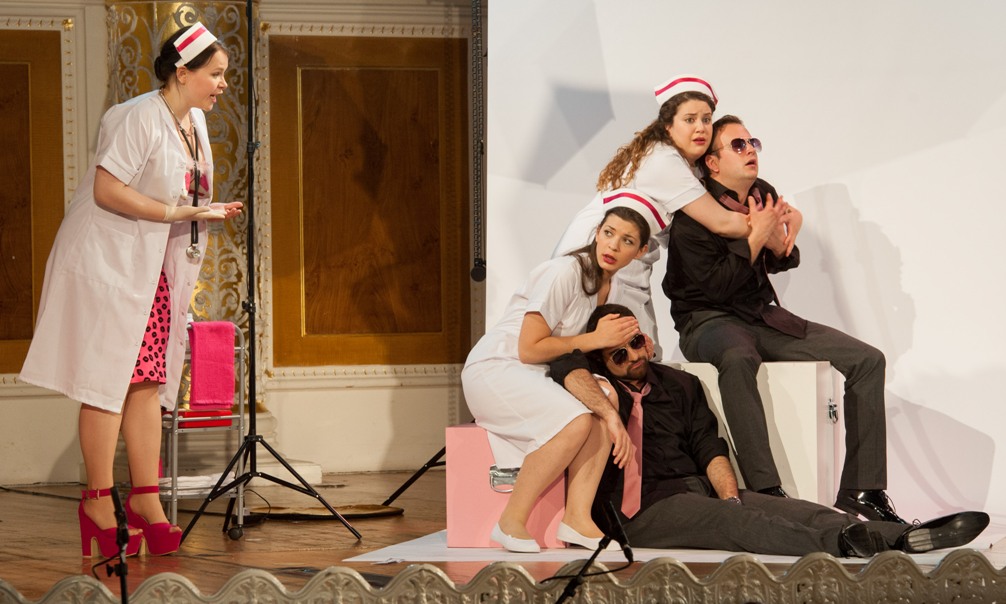Così fan tutte, European Opera Centre, RLPO, Pillot, St George’s Hall Concert Room, Liverpool | reviews, news & interviews
Così fan tutte, European Opera Centre, RLPO, Pillot, St George’s Hall Concert Room, Liverpool
Così fan tutte, European Opera Centre, RLPO, Pillot, St George’s Hall Concert Room, Liverpool
Young singers, Liverpool's great orchestra and a sassy production pull off intimate Mozart

One of the joys of attending an opera in the Concert Room at St George’s Hall, Liverpool, is the feeling that the audience is sitting in the set itself. Now one of the city’s foremost concert venues, this Victorian gem never ceases to amaze, even though it was reintroduced to active use in 2006 after extensive refurbishment.
So it was that the Royal Liverpool Philharmonic Orchestra came together with the city-based European Opera Centre for this production of Così fan tutte. In many ways, the intimate setting – the hall only seats around 500 – made the audience really feel part of the action and, unlike in large theatres, it was possible to see the small gestures, facial expressions and general camp silliness which made the production such a success. It was also musically extremely bright: there are no carpets or curtains to dull the sound and the bare walls exposed every note, leaving nothing uncovered.
This foray into perhaps more mainstream repertoire is as welcome as it is rare
Joanne Milanese designed a simple set which worked perfectly. The first act was set in a photographic studio where Fiordiligi and Dorabella – two comically spoilt brats – are being photographed by Don Alfonso for various advertising campaigns. And while they are acting as aspiring starlets, Despina spends much of her time puncturing the bubble in which they live. Just as the women populate a make-believe world, so do the men with Ferrando and Gugliemo veering between bumbling idiots and suave men-of-the-world.
The only mystery in the production itself was why the main characters suddenly donned 18th century costume for the first part of the second act. That was strange, bearing in mind that the whole of the black-grey and shocking pink theme of the costumes throughout was applied to modern, and often very flattering, dress. Maybe a question for costume designer Natacha Costechareire.
Overall, though, conductor Laurent Pillot ran a well-paced performance with absolutely no let-up in the action. The real stars, however, were the six singers, products of one of Liverpool’s real musical secrets. The European Opera Centre was founded in 1997 and has specialised not only in nurturing musical talent but has also unearthed and produced rare and unusual repertoire, working with major performers and ensembles around the world. This foray into perhaps more mainstream repertoire is as welcome as it is rather rare.
 There was a real confidence on the part of the performers. Of particular note was tenor Alexander Sprague, singing Ferrando – catch him in Welsh National Opera’s Moses und Aaron at the Royal Opera House later this month. He was sprightly, funny, and has a voice which projected unstrained purity. Héloïse Mas, making her UK début, gave an assured performance as Dorabella but was rather eclipsed by soprano Nazan Fikret, whose comic Fiordiligi was excellent.
There was a real confidence on the part of the performers. Of particular note was tenor Alexander Sprague, singing Ferrando – catch him in Welsh National Opera’s Moses und Aaron at the Royal Opera House later this month. He was sprightly, funny, and has a voice which projected unstrained purity. Héloïse Mas, making her UK début, gave an assured performance as Dorabella but was rather eclipsed by soprano Nazan Fikret, whose comic Fiordiligi was excellent.
But, if there was a prize for comedy and for adaptability, it had to go to Hamida Kristoffersen (pictured above, on the left), who sang Despina. It might not be as big a role as the others, but her facial expressions and, in particular, her interpretation of a wizened old lawyer, was unforgettable. With all its pointed campness, charm, assured poise of the singers and comic wit, this was a production which would be hard to rival.
The future of Arts Journalism
You can stop theartsdesk.com closing!
We urgently need financing to survive. Our fundraising drive has thus far raised £49,000 but we need to reach £100,000 or we will be forced to close. Please contribute here: https://gofund.me/c3f6033d
And if you can forward this information to anyone who might assist, we’d be grateful.

Subscribe to theartsdesk.com
Thank you for continuing to read our work on theartsdesk.com. For unlimited access to every article in its entirety, including our archive of more than 15,000 pieces, we're asking for £5 per month or £40 per year. We feel it's a very good deal, and hope you do too.
To take a subscription now simply click here.
And if you're looking for that extra gift for a friend or family member, why not treat them to a theartsdesk.com gift subscription?
more Opera
 La bohème, Opera North review - still young at 32
Love and separation, ecstasy and heartbreak, in masterfully updated Puccini
La bohème, Opera North review - still young at 32
Love and separation, ecstasy and heartbreak, in masterfully updated Puccini
 Albert Herring, English National Opera review - a great comedy with depths fully realised
Britten’s delight was never made for the Coliseum, but it works on its first outing there
Albert Herring, English National Opera review - a great comedy with depths fully realised
Britten’s delight was never made for the Coliseum, but it works on its first outing there
 Carmen, English National Opera review - not quite dangerous
Hopes for Niamh O’Sullivan only partly fulfilled, though much good singing throughout
Carmen, English National Opera review - not quite dangerous
Hopes for Niamh O’Sullivan only partly fulfilled, though much good singing throughout
 Giustino, Linbury Theatre review - a stylish account of a slight opera
Gods, mortals and monsters do battle in Handel's charming drama
Giustino, Linbury Theatre review - a stylish account of a slight opera
Gods, mortals and monsters do battle in Handel's charming drama
 Susanna, Opera North review - hybrid staging of a Handel oratorio
Dance and signing complement outstanding singing in a story of virtue rewarded
Susanna, Opera North review - hybrid staging of a Handel oratorio
Dance and signing complement outstanding singing in a story of virtue rewarded
 Ariodante, Opéra Garnier, Paris review - a blast of Baroque beauty
A near-perfect night at the opera
Ariodante, Opéra Garnier, Paris review - a blast of Baroque beauty
A near-perfect night at the opera
 Cinderella/La Cenerentola, English National Opera review - the truth behind the tinsel
Appealing performances cut through hyperactive stagecraft
Cinderella/La Cenerentola, English National Opera review - the truth behind the tinsel
Appealing performances cut through hyperactive stagecraft
 Tosca, Royal Opera review - Ailyn Pérez steps in as the most vivid of divas
Jakub Hrůša’s multicoloured Puccini last night found a soprano to match
Tosca, Royal Opera review - Ailyn Pérez steps in as the most vivid of divas
Jakub Hrůša’s multicoloured Puccini last night found a soprano to match
 Tosca, Welsh National Opera review - a great company reduced to brilliance
The old warhorse made special by the basics
Tosca, Welsh National Opera review - a great company reduced to brilliance
The old warhorse made special by the basics
 BBC Proms: The Marriage of Figaro, Glyndebourne Festival review - merriment and menace
Strong Proms transfer for a robust and affecting show
BBC Proms: The Marriage of Figaro, Glyndebourne Festival review - merriment and menace
Strong Proms transfer for a robust and affecting show
 BBC Proms: Suor Angelica, LSO, Pappano review - earthly passion, heavenly grief
A Sister to remember blesses Puccini's convent tragedy
BBC Proms: Suor Angelica, LSO, Pappano review - earthly passion, heavenly grief
A Sister to remember blesses Puccini's convent tragedy
 Orpheus and Eurydice, Opera Queensland/SCO, Edinburgh International Festival 2025 review - dazzling, but distracting
Eye-popping acrobatics don’t always assist in Gluck’s quest for operatic truth
Orpheus and Eurydice, Opera Queensland/SCO, Edinburgh International Festival 2025 review - dazzling, but distracting
Eye-popping acrobatics don’t always assist in Gluck’s quest for operatic truth

Add comment